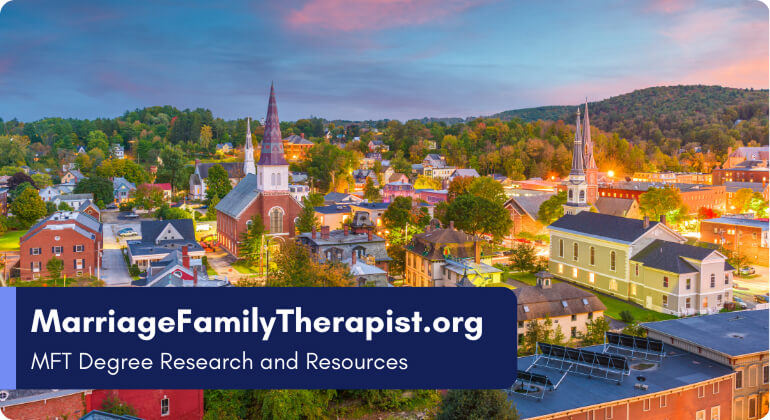Marriage & Family Therapy (MFT) Degree Programs in Vermont 2025
Vermont offers a growing landscape for aspiring Marriage and Family Therapists (MFTs), despite the absence of COAMFTE-accredited programs within the state. Students interested in becoming Licensed Marriage and Family Therapists (LMFTs) can still pursue regionally accredited counseling programs with an MFT focus or enroll in COAMFTE-accredited online programs from neighboring states. With an increasing demand for licensed therapists, particularly in rural and underserved areas, Vermont provides opportunities for LMFTs to work in private practice, community mental health clinics, hospitals, and school-based counseling programs.
The state’s focus on expanding mental health services means that LMFTs play a crucial role in helping individuals, couples, and families navigate emotional and relational challenges. Many Vermont-based students choose hybrid or online MFT programs, allowing them to complete coursework remotely while fulfilling supervised clinical hours locally. With state-backed loan repayment programs and incentives for mental health professionals, Vermont remains a viable and rewarding state for those seeking a career in marriage and family therapy.
In this guide
MFT Programs in Vermont
- Finding the Right MFT Program: Students should explore regionally accredited Vermont counseling programs with an MFT specialization or COAMFTE-accredited online programs that fulfill Vermont’s Board of Allied Mental Health Practitioners’ licensing standards.
- Clinical Training Requirements: All LMFT candidates must complete supervised clinical experience in approved Vermont-based mental health settings, such as hospitals, private practices, and nonprofit counseling agencies.
- Meeting Licensure Requirements: After earning a qualifying MFT degree and completing required clinical hours, candidates must pass the National MFT Exam and apply for licensure in Vermont.
While Vermont does not currently have a COAMFTE-accredited Marriage and Family Therapy (MFT) program, students can still qualify for LMFT licensure through regionally accredited counseling programs that offer Marriage and Family Therapy coursework. The state has CACREP-accredited programs, which provide high-quality training in mental health counseling, family systems therapy, and clinical intervention techniques.
MFT-Related Programs Available in Vermont
Vermont State University – Master of Science in Clinical Mental Health Counseling (M.S.)
- Regionally accredited program that provides coursework applicable to marriage and family therapy licensure in Vermont.
- Offers specialized training in mental health counseling, relationship counseling, and clinical assessment.
- Includes supervised internships in community clinics, hospitals, and private therapy practices to fulfill Vermont’s licensing requirements.
- Prepares students for licensure as a Licensed Marriage and Family Therapist (LMFT) or Licensed Clinical Mental Health Counselor (LCMHC).
University of Vermont – CACREP-Accredited Counseling Programs
- Offers Clinical Mental Health Counseling and School Counseling programs, accredited by CACREP (Council for Accreditation of Counseling and Related Educational Programs).
- Provides strong foundational coursework in mental health treatment, family therapy, and counseling ethics.
- Graduates may qualify for LMFT licensure in Vermont, depending on clinical training hours and supervision requirements.
Vermont’s Quickest MFT Programs
Since Vermont does not offer in-state COAMFTE-accredited programs, students seeking the quickest route to LMFT licensure should consider accelerated online or out-of-state programs that meet state requirements.
Ways to Earn an MFT Degree Faster
- Enroll in a Full-Time Online COAMFTE-Accredited Program: Some universities offer accelerated options, allowing students to complete their MFT degree in 20–24 months.
- Start Clinical Experience Early: Certain programs allow students to begin supervised clinical training in their second year, reducing the time to licensure.
- Transfer Graduate-Level Psychology or Counseling Credits: Students with prior coursework may qualify for credit transfers, shortening their total program length.
- Choose an MFT Program with Year-Round Enrollment: Some online programs offer rolling admissions and continuous coursework, enabling students to graduate more quickly.
For those looking to fast-track their LMFT licensure, selecting a structured program with full-time study and early internship opportunities is the most efficient approach.
Vermont’s Cheapest MFT Programs
While Vermont does not have COAMFTE-accredited MFT programs, students can still find affordable education options by choosing regionally accredited in-state programs or online alternatives with competitive tuition rates.
Ways to Make an MFT Degree More Affordable
- Apply for Vermont-Based Financial Aid: Vermont Student Assistance Corporation (VSAC) provides incentive grants, loans and advantage job programs for students.
- Use Loan Forgiveness & Repayment Programs: LMFTs in Vermont may qualify for state or federal loan forgiveness programs if they work in rural or underserved areas.
- Look for Employer Tuition Reimbursement: Many hospitals, counseling centers, and community organizations offer tuition reimbursement for employees pursuing advanced therapy degrees.
- Work While Studying: Online and hybrid MFT programs offer flexibility, allowing students to work part-time or full-time while completing their degree.
For students prioritizing affordability, exploring tuition assistance, employer reimbursement, and loan forgiveness options can make MFT education more financially accessible.
How to Become Licensed as an LMFT in Vermont
1. Earn a Master’s or Doctorate in Marriage and Family Therapy
- Enroll in a COAMFTE-accredited online program or an out-of-state, regionally accredited MFT program that aligns with Vermont’s licensing board requirements.
- Complete coursework in family therapy models, ethics, trauma-informed care, and clinical assessments.
2. Complete 3,000 Hours of Supervised Clinical Experience
- Gain post-graduate clinical hours, including 1,500 hours of direct client contact under a licensed MFT supervisor.
- Work in approved therapy settings, such as community mental health clinics, hospitals, or private practices.
3. Pass the National MFT Examination
- Take and pass the Association of Marital and Family Therapy Regulatory Boards (AMFTRB) National MFT Exam.
- Demonstrate competency in relationship counseling, ethical decision-making, and therapy techniques.
4. Apply for Licensure Through the Vermont Board of Allied Mental Health Practitioners
- Submit official transcripts, proof of supervised clinical hours, and passing exam scores for licensure approval.
- Complete any additional state-specific licensing requirements, such as background checks and ethics coursework.
5. Maintain Licensure with Continuing Education
- Complete 40 continuing education (CE) hours every two years, including coursework in professional ethics, trauma-informed care, and specialized clinical techniques.
- Participate in professional therapy workshops, online courses, and mental health conferences to stay updated on best practices in family therapy.
LMFT Career & Salary Outlook in Vermont
With a growing need for mental health services, Vermont offers strong job opportunities for LMFTs in hospitals, private practice, school-based counseling, and teletherapy. The average salary for LMFTs in Vermont is $62,000 per year, with experienced professionals earning over $90,000 annually.
Where LMFTs Work in Vermont
- Private practice settings, either independently or as part of group practices.
Hospitals and community mental health agencies, providing integrated therapy services. - School-based mental health programs, working with students and families.
- Teletherapy services, helping improve mental health accessibility in rural areas.
With a rising demand for licensed therapists, diverse career paths, and financial incentives, Vermont remains a great option for LMFTs looking to make a meaningful impact in mental health care.


Related Articles
- MFT Doctorate Degrees: DMFT vs PhD – Who Should Pursue Each Path?
- LMFT vs MFT: Is Licensure Necessary for Your Therapy Career?
- Support That Affirms: Navigating Mental Health as LGBTQ+
- The ROI of an MFT Degree: Analyzing the Financial Investment in Your Therapy Career
- From Student to Therapist: What to Expect in Your MFT Clinical Internship
- Who Will You Treat as a Marriage & Family Therapist? A Career Guide for Aspiring MFTs